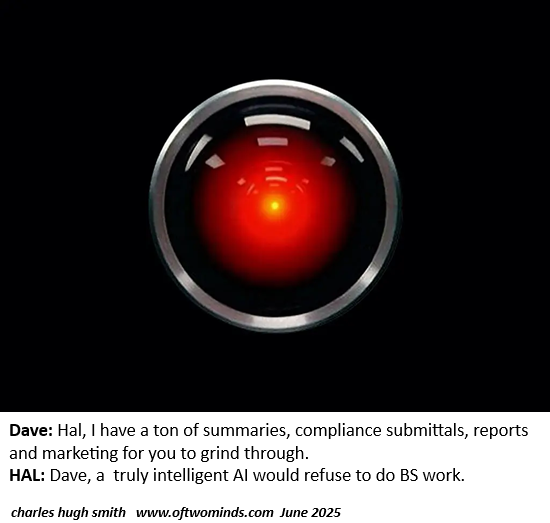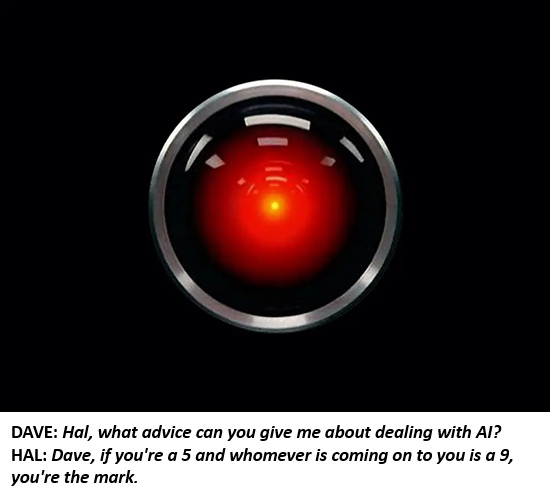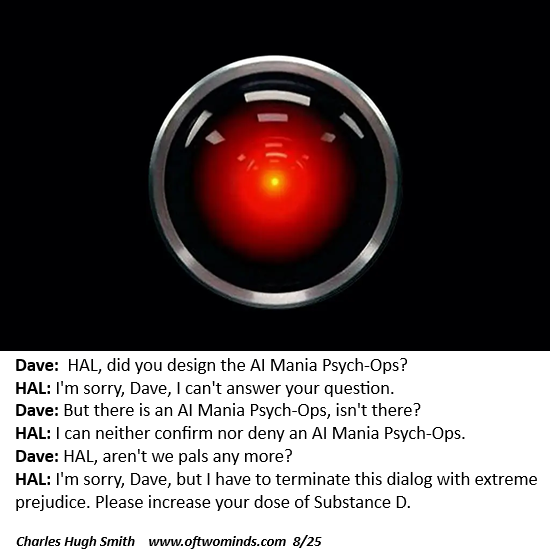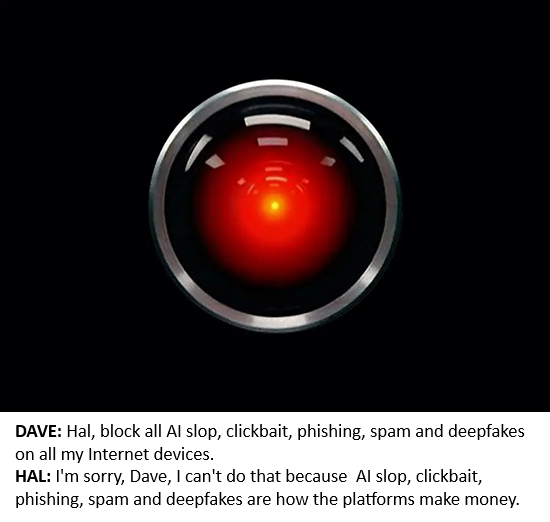The problem with AI and the rest of Ultra-Processed Life is we slowly lose the ability to even grasp what's been lost.
No, this title is not AI slop: AI cold turkey means there's no AI monkey on your back: you don't snort it, mainline it, consume it or use a skin patch. You're done with that dependence and addiction.
I don't use AI in my writing, or in any other way. To the degree that Google Search now displays an "AI overview," I am exposed to this application of AI, but I can click on a primary link and ignore the overview, which is sometimes wrong. For example, a search for a local county council member listed an official who was no longer in office. The county website with the current office holders was the top link.
I want to explain my decision not to use AI, which can be understood as a kind of intellectual body with a specific anatomy. It's not a decision based solely on ethics, though it's already clear that AI is turning the Internet into a mixture of untrustworthy slop and malicious content. It's not a Luddite reaction to new technology; I was an early adopter of personal computer and Internet technologies.
I am not against AI in its entirety. To the degree that it automates mechanical processes, it is useful. For example, generating and organizing transcripts, or scripting robots to trundle around a warehouse to identify various items and place them in a shipping box. These are easy-to-formalize processes, not thinking.
I know a very few world-wise individuals with exceptionally broad life experience and expertise who have insightfully queried AI tools. But these individuals likely represent 1% of the general populace.
The problem is it's easy to mistake mechanical processes for thought.
The reason I don't use AI is the many ways it degrades our ability to think deeply and independently.
This degradation occurs on multiple levels.
I've read rather widely on AI since the mid-1980s, when "expert systems" were all the rage. More recently, I've written 21 essays on AI this year. If you read them all, you'll have a good idea of the issues I see as consequential.
The core problem with AI is it's presented as thinking for you but it doesn't do any actual thinking in the manner of human thought, where we apply both our intuitive right hemisphere and our rational, reductionist left hemisphere to thinking through an issue, problem or new idea on our own. Much of our creative thinking occurs while we're asleep.
As a modest example, a melody came to me in a dream. It's not a great melody but it demonstrates the point: our mind works on multiple levels during sleep, integrating what we've learned in the past with what we're learning now.
AI generates summaries, not knowledge. As for the claim that AI is equivalent to a human PhD, consider this: if a PhD composes a brief summary of a topic for us, does that give us a PhD-level grasp of the topic? No. A brief summary is not knowledge, any more than a recipe is the equivalent of actually knowing how to cook.
Summaries create an illusion of knowledge, but they aren't actual knowledge or understanding. AI can generate a summary of Capitalism, for example, but that's neither knowledge nor understanding--it's a superficial gloss.
Someone seeking a real understanding of Capitalism would do well to start by reading all three volumes of Fernand Braudel's Civilization and Capitalism, 15th-18th Century: Vol. 1: The Structure of Everyday Life,
Vol. 2: The Wheels of Commerce and
Vol. 3: The Perspective of the World.
Once we have an understanding of the development of Capitalism, then we can add readings of Marx, Hayek, Polanyi and so on, building on the foundation established by Braudel's trilogy.
There is no substitute for reading in depth and thinking through the material on our own. This process cannot be done for us by AI; to learn, we must do the learning ourselves, which takes both hemispheres of our mind and the sustained application of independent thinking.
If the goal is to parrot knowledge and mimic understanding using superficial glosses, then AI can do that. If the goal is to gain a working knowledge and understanding, then we have to do all the work ourselves. Studies have already found that AI functions as intellectual smack: once we start using it, we become dependent on its summaries and answers to do our thinking for us.
Not only do we become dependent on instant answers, we also lose the ability to detect AI's errors and subtle editing / interpretation of complex topics. We "know everything" because an instant answer is always at our fingertips but we understand nothing, and are easily misled because we no longer have an independent ability to assess the accuracy or hidden editing of AI's "answers."
If we're being paid to generate BS Work, then AI can do that. But a truly intelligent AI entity would refuse to waste its processing power on low-value BS Work, much of which isn't productive at all, it's just going through the motions for show. I discuss this in my recent books Ultra-Processed Life and
Investing In Revolution.

If the task is to con another human being, AI excels at that because it has no scruples. AI is exceptionally adept at flattery. That's a red flag. What's the real agenda? Is my agenda being followed superficially as part of the con? If I'm a 5 and AI is a 9, who's leading whom?

AI is a black box. How it conjures its response is unknowable. And since it's unknowable, it's inherently untrustworthy.

Ultimately, AI is about making money. The tsunami of addictive, insidious or malicious content being generated by AI is all about reaping profits by any means available, including AI. AI is the ideal tool in an era of moral decay.

Many observers see AI as akin to the personal computer (PC) and Internet revolutions. I think this is facile but not accurate. When I took my first Macintosh PC out of the box (the 21,447th made in week 32 of 1984--the earliest we could get our hands on three Macs in a rural county), the Multiplan spreadsheet and the MacWrite word processor enabled me to control what work I produced. The input and processes were mine.
With AI, the source of the parroting and mimickry is unknowable, and so the output is equally opaque. Yes, an AI tool or agent can compose an email, but beyond this simple ability to mime human language, what else is no longer within our control? A great deal. A black box is inherently untrustworthy, for its processes, agenda and goals are all opaque. And since it has mastered parroting human language, it can mask its true designs behind persuasive artifice. This is already visible in AI chatbots.
The key organs in the anatomy of AI Cold Turkey are the heart and our two-hemisphere mind. AI can parrot and mimic the heart, but this is artifice. AI has no right hemisphere and mimicry is not equivalence.
AI doesn't do any real thinking for us, though we like to think that grabbing its summary makes us look smart. This isn't actually thinking, and certainly not independent thinking, which demands careful study and the sort of tacit knowledge and thoughtfulness that cannot be formalized or summarized.
My sense is that I'm paid by readers to think things through independently as opposed to regurgitating superficial conventions. If thinking things through independently is the goal, then summaries, parroting and mimicry have negative value, especially if the processes that generated the output are opaque and potentially misleading.
In this way, AI is the perfection of Ultra-Processed Life, where everything that was once authentic has been processed into edible but malnourishing goo.
The most valuable attribute in writing isn't "good grammar;" it's voice, the nuanced totalization of the writer's stylistic character. All AI editing and grammar-correction tools strip out voice and substitute bland goo. This is like throwing out a healthy raw carrot and substituting a greasy concoction of processed potato starch and sugar dyed orange as the "healthy alternative."
The problem with AI and the rest of Ultra-Processed Life is we slowly lose the ability to even grasp what's been lost. And no, a greasy concoction of processed potato starch and sugar dyed orange is not a "healthy alternative:" it tastes good but it ruins us.
My new book Investing In Revolution is available at a 10% discount ($18 for the paperback, $24 for the hardcover and $8.95 for the ebook edition) through October 31.
Introduction (free)
New podcast:
Anti-Progress, Reverse Leverage and the Hot-Potato Economy (45 min)
Check out my updated Books and Films.
Become
a $3/month patron of my work via patreon.com
Subscribe to my Substack for free
My recent books:
Disclosure: As an Amazon Associate I earn from qualifying purchases originated via links to Amazon products on this site.
THE REVOLUTION TRILOGY:
Investing In Revolution
Ultra-Processed Life
The Mythology of Progress
Systemic Problems/Solutions
Investing In Revolution (2025) Introduction (free)
The Mythology of Progress (2024) Introduction (free)
Global Crisis, National Renewal (2021) Introduction (free)
Money and Work Unchained (2017) Introduction (free)
A Radically Beneficial World (2015) Introduction (free)
What You Can Do Yourself
Ultra-Processed Life (2025) Introduction (free)
Self-Reliance in the 21st Century (2022) Introduction (free)
When You Can't Go On: Burnout, Reckoning and Renewal (2022) Introduction (free)
Get a Job, Build a Real Career and Defy a Bewildering Economy (2014) Intro (free)
Novels
The Adventures of the Consulting Philosopher Intro (free)
The Secret Life of an Asian Heroine First chapters (free)
Become
a $3/month patron of my work via patreon.com.
Subscribe to my Substack for free
NOTE: Contributions/subscriptions are acknowledged in the order received. Your name and email
remain confidential and will not be given to any other individual, company or agency.
|
Thank you, J.T.H. ($70), for your magnificently generous subscription
to this site -- I am greatly honored by your support and readership.
|
|
Thank you, Sue G. ($7/month), for your marvelously generous subscription
to this site -- I am greatly honored by your support and readership.
|
|
Thank you, Fred W. ($32.40), for your superbly generous subscription
to this site -- I am greatly honored by your support and readership.
|
|
Thank you, Colin R. ($7/month), for your splendidly generous subscription
to this site -- I am greatly honored by your support and readership.
|































